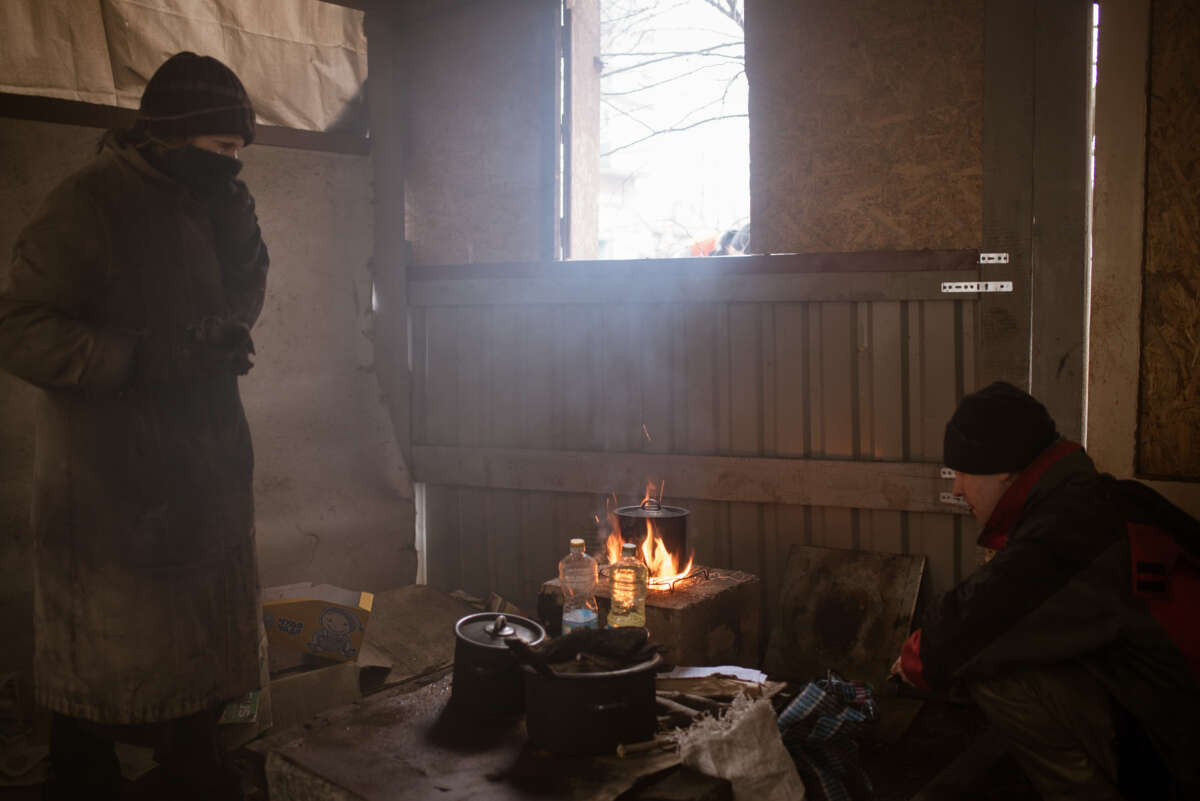Part of the Series
Russia's War on Ukraine in an Age of Escalating Imperial Tensions
Despite international calls for a holiday ceasefire, the Russian military launched massive missile and drone attacks on Ukrainian towns and energy infrastructure this week, killing several civilians and robbing millions more of heat and light as the new year approaches.
Russian President Vladimir Putin is clearly punishing Ukrainians for resisting his invasion and locking his forces in a bloody war inching towards Russia’s border. However, Putin was already planning to leave portions of Ukraine in the dark during the freezing winter months long before his troops stormed across the border in February.
The Kremlin’s plan for taking over the Ukrainian government and “subjugating” the population offers a glimpse at what life would be like today had resistance failed and Kyiv fell in the early days of the war. The Royal United Services Institute (RUSI), a think tank with access to British military intelligence, recently reported that an increasingly isolated Putin and a small inner circle originally planned to starve rebellious regions of Ukraine of electricity, water and financing after overtaking the central government and arresting or killing top officials. In Parliament, the pro-Russian faction would form a “Movement for Peace” and outlaw resistance. Any region that continued to rebel would suffer power outages and be cut off from the national banking system.
The process of installing a pro-Russian regime would have been ugly, complete with show trials and executions of pro-Western activists and top Ukrainian political leaders, according to the report. Other Ukrainians would be intimidated into submission at “filtration camps” designed to root out potential resisters, a brutal practice now infamous for terrorizing civilians in areas of Luhansk and Donbas occupied by Russia.
Russia assumed that a lightning blitz across Ukraine and the quick capture of Kyiv would shock the population and leave the United States and its European allies with few options for international intervention. Indeed, Russian forces outnumbered Ukrainian troops 12 to 1 in areas north of Kyiv during the early days of the failed campaign to topple the government, but Ukrainians exploited a series of tactical blunders and pushed the Russians back.
Putin’s plan for subjugating Ukraine was based on faulty intelligence and several assumptions that simply did not pan out, according to the report. Putin’s inner circle assumed some parts of Ukraine, particularly in the Russian-speaking east, would be easily pacified as local leaders were coerced or killed and pro-Russians rallied to the cause. Meanwhile, what was left of the Ukrainian military would be bogged down in the Donbas region, where Russia is currently defending annexed territory despite embarrassing retreats and an incredible loss of life.
Controlling access to heat in the winter months would be an effective means of controlling the rest of Ukraine’s “apathetic majority,” the Russians assumed, and resistance in anti-Russian regions could be snuffed out as temperatures plunged over the coming winter.
Now that winter has come, but Putin’s scheme for taking Kyiv and occupying Ukraine did not work out as planned. On a military-strategic level, the invasion is considered an international embarrassment. Still, Russia is resorting to many of the same tactics laid out in its original plan for taking Kyiv, including the detention, torture and execution of local leaders and suspected resisters in occupied territories, as well as attacks on energy infrastructure needed for daily life.
Seizing nuclear power plants that supply about 60 percent of Ukraine’s electricity was a key part of Putin’s plan, both to control the power supply and blackmail European countries with the threat of a nuclear accident if they were to intervene, according to RUSI. Today, Russia continues to control the Zaporizhzhia nuclear power plant in a portion of occupied southern Ukraine, where Moscow and Kyiv have blamed each other for shelling that had shut down the plant several times and alarmed the world.
Ukrainian authorities reported blackouts across the country on Thursday after a barrage of missile strikes left several people injured ahead of New Year’s celebrations. Authorities reported that 40 percent of Kyiv and 90 percent of Lviv, two of the nation’s major cities under Ukrainian control, were without power as of Thursday. Ukrainians reacted again with anger and defiance, adding the holiday attacks on the power grid to a long list of alleged Russian war crimes that have emerged as a major roadblock to peace. Ukrainian President Volodymyr Zelenskyy recently accused Putin of using the freezing winter weather as a “weapon of mass destruction.”
Ukrainian forces claimed to have shot down 54 of the 69 missiles fired by Russia on Thursday, although these numbers are not independently confirmed. In a statement, the Ukrainian Defense Ministry said the “Russian terrorists” saved one of their largest missile attacks since the invasion for the last days of the year.
“They dream that Ukrainians will celebrate the New Year in darkness and cold,” the ministry said on Twitter. “But they cannot defeat the Ukrainian people.”
Join us in defending the truth before it’s too late
The future of independent journalism is uncertain, and the consequences of losing it are too grave to ignore. To ensure Truthout remains safe, strong, and free, we need to raise $17,000 by midnight tonight. Every dollar raised goes directly toward the costs of producing news you can trust.
Please give what you can — because by supporting us with a tax-deductible donation, you’re not just preserving a source of news, you’re helping to safeguard what’s left of our democracy.
